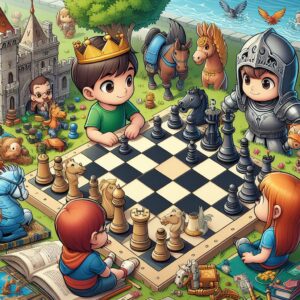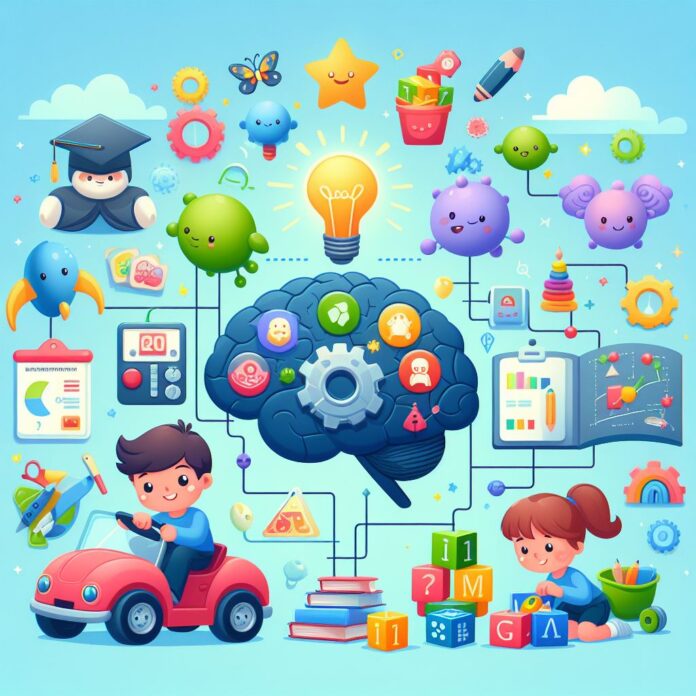In the rapidly evolving world of education, the integration of educational games into learning environments has become a transformative strategy for enhancing children’s cognitive development. These interactive games not only entertain but also build foundational skills that foster intellectual growth across various domains. From improving critical thinking and problem-solving skills to boosting memory, processing speed, and spatial intelligence, educational games play a crucial role in a child’s educational journey.
This article delves into how these games sharpen young minds, preparing them for future academic and life challenges.
I. Stimulating Critical Thinking and Problem-Solving:

Educational games are masterfully designed to enhance critical thinking and problem-solving skills, crucial components of a child’s intellectual development. These games often involve complex scenarios that require players to engage deeply with the task at hand, pushing them to analyze, evaluate, and synthesize information before making decisions.
1. Chess:
A quintessential example of a game that boosts critical thinking, chess demands foresight, strategic planning, and tactical acuity. Players must consider not only their own moves but also anticipate their opponent’s responses, teaching children to think several steps ahead and understand the consequences of their actions in a controlled environment.
2. Logic Puzzles:
Logic puzzles, such as riddles, crosswords, and brain teasers, challenge players to use deductive reasoning and pattern recognition to solve problems. These activities improve cognitive abilities by requiring the solver to connect the dots and discern underlying rules from limited information. They are excellent for developing a child’s ability to work through complex problems systematically.
3. Strategy-based Video Games:
These games simulate real-world systems or abstract complexities and require the player to manage resources, control territories, or guide characters through various challenges. Games like “Civilization” and “Starcraft,” for instance, involve layers of strategic decision-making that can influence cognitive skills like resource management, logistical planning, and multitasking.
4. Educational Benefits:
– Enhanced Focus and Attention: Engaging with these games requires sustained concentration and attention to detail, helping children develop the ability to focus on tasks for longer periods without distraction.
– Improved Memory Recall: Strategy games often involve remembering significant amounts of information about past and potential future game states, which can enhance both short-term and long-term memory.
– Flexibility in Thinking: Children learn that there are multiple ways to solve a problem, which can make them more flexible and adaptive thinkers.
II. Enhancing Memory and Processing Speed:

Educational games that focus on enhancing memory and processing speed are essential tools for boosting a child’s cognitive functions. These games are structured to provide engaging, repetitive tasks that improve both recall abilities and the speed at which a child processes information.
1. Memory Matching Games:
Games like “Concentration” or memory card games require players to remember the location and attributes of various card pairs that are placed face down. As children try to match pairs, they engage their short-term and working memory. Each game round encourages them to recall information quickly and accurately, reinforcing neural connections related to memory.
2. Speed Games:
These games are designed to increase the speed at which a child thinks and reacts. Fast-paced trivia games, reaction-time games, or any app that times the player as they solve problems, press for rapid responses under pressure. Such environments mimic real-life situations where quick decision-making is critical, training the brain to process information swiftly and efficiently.
3. Educational Benefits:
– Boosted Neural Efficiency: Regular practice with memory and speed games can lead to faster synaptic responses, essentially speeding up the brain’s processing capabilities.
– Enhanced Cognitive Flexibility: The ability to switch between tasks rapidly and efficiently is a key skill developed through speed games, enhancing overall cognitive flexibility.
– Improved Attention to Detail: Memory games often include complex patterns or varied stimuli that require attention to subtle differences, training children to notice and remember fine details.
III. Developing Mathematical and Logical Intelligence:

Mathematical and logical intelligence are critical cornerstones of a child’s cognitive development, particularly for success in STEM (Science, Technology, Engineering, Mathematics) fields. Educational games that focus on mathematics and logic not only engage children in fun and interactive ways but also solidify crucial analytical skills.
1. Sudoku and Other Logic Puzzles:
Sudoku is a prime example of a logic-based puzzle that improves cognitive function. It requires players to identify patterns and use deductive reasoning to fill in a grid with numbers that do not repeat in any row, column, or square. Other logic puzzles, such as nonograms or logic grid puzzles, also teach children to recognize patterns, develop sequence-solving abilities, and enhance deductive reasoning skills.
2. Math-Based Apps:
Applications like DragonBox, which uses games to teach algebra, or Prodigy, a role-playing math game, make mathematical concepts enjoyable and relatable. These apps transform abstract math principles into visual and interactive challenges, helping children grasp complex ideas like fractions, geometry, and basic arithmetic in a context that makes sense to them.
3. Educational Benefits:
– Enhanced Problem-Solving Skills: Regular practice with math and logic games enhances a child’s ability to think critically and solve problems efficiently.
– Increased Pattern Recognition: These games help children recognize and predict patterns, a skill that is applicable in many real-life situations and academic subjects.
– Improved Abstract Thinking: By engaging with abstract concepts tangibly, children develop the ability to think abstractly, which is vital for advanced mathematics and science.
IV. Cultivating Language and Verbal Abilities:

Enhancing language and verbal abilities is essential for children, not only for academic success but also for effective communication throughout life. Word-based games and interactive storytelling apps play a crucial role in developing these skills by immersing children in language-rich activities.
1. Scrabble and Other Word Games:
Scrabble is a classic example that challenges players to create words from randomly drawn letters, rewarding points based on letter difficulty and word length. This game enhances vocabulary and spelling skills and encourages strategic thinking about word placement and potential point maximization. Similar games like Boggle, where players find words in a matrix of letters, boost quick thinking and pattern recognition in language contexts.
2. Interactive Storytelling Apps:
Apps like StoryJumper or Toontastic encourage children to create their own stories, providing tools to build narratives, choose characters, and dictate events. This form of interactive play develops not only grammar and vocabulary but also storytelling skills, fostering creativity and expressive language abilities.
3. Educational Benefits:
– Expanded Vocabulary: Regular engagement with word games introduces children to new words and contexts, significantly expanding their vocabulary.
– Enhanced Reading and Writing Skills: Through gameplay, children practice reading and writing, reinforcing their understanding and usage of grammar and sentence structure.
– Improved Communication Skills: As children learn new words and how to effectively use them, their overall communication skills improve, aiding them in expressing themselves clearly and confidently.
V. Encouraging Scientific Thinking and Curiosity:

Fostering scientific thinking and curiosity in children is crucial for developing a lifelong love of learning and exploration. Science-based games that simulate experiments or allow exploration of natural phenomena provide an engaging way to introduce complex scientific concepts and methodologies.
1. Simulation Games:
Apps like “Toca Lab” or “The Sandbox” allow children to experiment with different elements and observe the outcomes of chemical reactions or physical changes. These simulations provide a safe and controlled environment where children can learn the basics of scientific experimentation, including trial and error and hypothesis testing.
2. Exploration Games:
Games that involve exploration of natural environments or outer space, such as “Star Walk” for astronomy or “Endless Ocean” for marine biology, helps children understand and appreciate the vastness and diversity of the natural world. By exploring and interacting with different ecosystems and celestial bodies, children learn to observe, classify, and understand natural phenomena.
3. Educational Benefits:
– Developed Critical Observation Skills: Children learn to observe details and changes closely, which is a fundamental skill in scientific research.
– Enhanced Problem-Solving Abilities: Engaging with scientific games encourages children to think critically and come up with solutions to scientific challenges.
– Strengthened Hypothesis Testing: These games provide opportunities for children to make predictions, conduct experiments, and then observe the results, reinforcing the scientific method.
VI. Boosting Spatial Intelligence:

Spatial intelligence is a key cognitive skill that enables individuals to comprehend and manipulate spatial relations. This type of intelligence is especially important in fields such as engineering, architecture, and visual arts. Engaging children in games that require spatial skills not only prepares them for potential careers in these areas but also enhances their ability to think and visualize in three dimensions.
1. Block-Building Games:
Classic toys like LEGO and modern digital apps like “Minecraft” allow children to construct buildings, vehicles, and entire worlds from blocks. These games require players to think about geometry, balance, and spatial relationships as they translate a mental vision into a physical or virtual structure. Block-building games are fundamental in developing an intuitive understanding of spatial dimensions and the physical laws that govern objects, such as gravity and balance.
2. Virtual Reality (VR) Simulations:
VR technology immerses players in a three-dimensional environment where they can interact with objects and spaces in ways that are impossible in the real world. Educational VR games can simulate physics experiments, architectural constructions, or abstract spatial puzzles, providing a hands-on experience that promotes a deeper understanding of complex spatial concepts.
3. Educational Benefits:
– Enhanced Visual-Spatial Reasoning: Engaging with spatially demanding games improves the ability to visualize and manipulate objects in space, a critical skill in many technical and artistic fields.
– Improved Geometry Skills: Through gameplay, children learn about shapes, volumes, and the properties of space, enhancing their geometry skills which are crucial for many academic and professional disciplines.
– Boosted Creative and Innovative Thinking: Spatial games often allow for creative expression, helping children develop innovative solutions to challenges and new designs that are not bound by conventional limitations.
Conclusion:
Educational games are more than just play; they are a dynamic and impactful tool for cultivating a range of cognitive abilities that are essential for children’s intellectual and personal growth. By strategically incorporating these games into regular learning activities, parents and educators can significantly enhance children’s abilities to think critically, solve problems, and engage creatively with the world around them.
Whether it’s mastering logical puzzles, navigating through complex story-driven quests, or constructing virtual models, each game offers a unique set of benefits that contribute to the holistic development of young learners. Encourage the integration of these educational games into your child’s routine to unlock their potential and ignite a lifelong passion for learning. Encourage your child’s intellectual growth by incorporating educational games into their playtime.
Explore a variety of games that align with their interests and watch as they enjoy learning and improving their cognitive abilities. Whether at home or in the classroom, these games are sure to make a significant impact on your child’s intellectual development.

